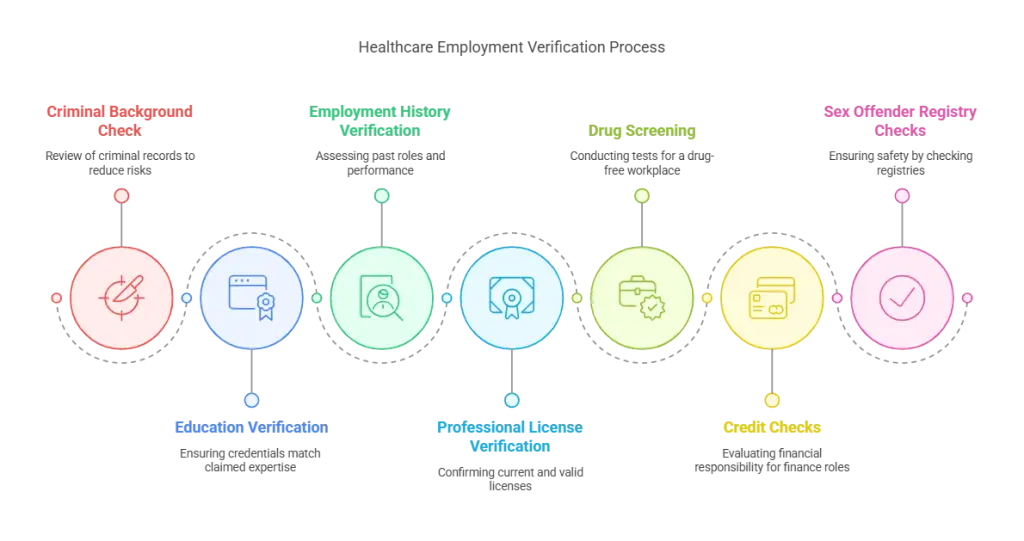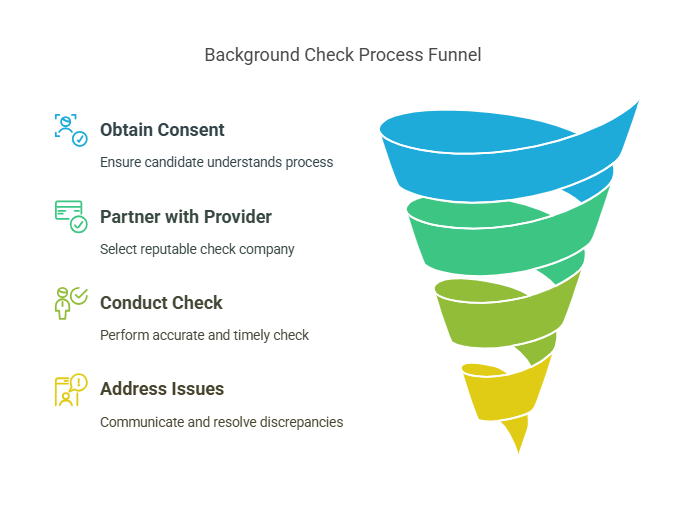Ensuring patient safety and maintaining the integrity of healthcare facilities is not just important—it's imperative. One key method hospitals use to uphold these standards is through comprehensive background checks. Join us as we explore the various layers of background screenings, the legal implications, and the undeniable necessity behind these evaluations in hospital employment.
Key Takeaways
- Over 90% of hospitals conduct background checks to prioritize patient safety and ensure trust in healthcare professionals.
- Background checks in hospitals include criminal record checks, education and employment verifications, professional license verifications, drug screenings, and more to safeguard both patients and staff.
- Federal and state laws, like the Fair Credit Reporting Act and EEOC guidelines, shape how hospitals conduct background checks, ensuring fairness and compliance.
- The process involves obtaining candidate consent, working with reputable providers, and addressing any issues transparently to uphold integrity.
- Thorough background checks enhance patient safety, reduce legal liabilities, maintain trust, protect assets, and support the delivery of quality care.
Introduction
While over 90% of hospitals conduct background checks on full-time employees, only 25% screen non-employee workers like contractors – a critical gap given their access to vulnerable populations1. This oversight is compounded by findings that 19% of nurse’s aides with substantiated abuse cases had prior criminal convictions, including theft and violent offenses. These statistics underscore why background checks are the first line of defense in healthcare.
This statistic underscores the pivotal role background checks play in healthcare. They act as the first line of defense in protecting both patients and hospital staff. Why is this so crucial? Because patients place immense trust in healthcare providers.
Balancing safety with individual rights can be challenging. Imagine a scenario where the need to protect patients conflicts with a candidate's career opportunities.
Background checks serve as a safeguard. They help mitigate risks and maintain trust. But how do you strike this balance without infringing on personal rights?
For hospitals, the aim should be clear: conduct thorough checks while respecting legal and ethical boundaries.
This practice isn't just a procedural formality. It involves assessing a range of factors, including criminal history, professional credentials, and more.
Therefore, understanding the necessity of these checks in hospital employment is crucial. They offer assurance that healthcare professionals meet standards essential for patient care.
Throughout this article, we'll delve into the integral role background checks play in this environment, ensuring they align with patient safety and legal frameworks. Ready to explore how these checks support not only hospitals but the broader healthcare system?
EXPERT INSIGHT: Nope, it's not just a checkbox. Background checks are more than just a bunch of paperwork and backend tasks before getting that dream job. It is a ticket to a healthy and safe workplace where trust and honesty thrive. It is an essential process that keeps an organization one step closer to meeting its goal -- both cultural and business-driven. - Charm Paz, CHRP
Types of Background Checks Conducted in Hospitals
When hiring in hospitals, background checks go beyond the basics. Each type serves a purpose, especially in an environment where lives are at stake.

Criminal Background Checks
A detailed review of criminal records can reduce risks, as seen in cases like Dr. Michael Swango, a serial killer who exploited inadequate screenings to work in hospitals. The stakes are high: 19% of nurse’s aides with abuse histories had prior convictions, often for theft or violence. Meanwhile, 80% of Americans support organizational background checks, reflecting public demand for accountability.
Education Verification
In medicine, credentials aren't just papers. They represent a standard of knowledge and training. Verifying degrees and certifications for roles like doctors and nurses is non-negotiable. Imagine a surgeon whose medical degree turns out to be fraudulent. The consequences could be dire. This step ensures that the candidate's expertise aligns with what they claim.
Employment History Verification
Learning about a candidate's previous roles, performance, and reasons for leaving offers valuable context. This also includes reference checks, providing insights into their work ethic and fit for the role. If a hospital administrator left their last job due to budget mishandling, that's relevant information. You want to know who you're bringing into your team.
Professional License Verification
Healthcare professionals must have current and valid licenses. This prevents the risk of unqualified individuals administering medical care. For example, an expired license or a history of disciplinary actions can indicate red flags about a practitioner’s reliability or competency.
Drug Screening
Pre-employment and sometimes random drug screenings are standard to ensure a drug-free workplace. These tests can prevent scenarios where healthcare workers may misuse prescription drugs, jeopardizing patient safety.
Credit Checks
These are less common but essential for roles involving hospital finance. If hiring a finance manager, a poor credit history might signal potential risks with handling financial responsibilities. This step helps mitigate risks like embezzlement or mishandling funds.
Sex Offender Registry Checks
These checks are mandatory in many jurisdictions, especially when working with vulnerable populations. Ensuring no staff is listed can protect patients from potential abuse. What would it mean if a caregiver were found on such a registry post-hire?
Implementing these checks builds a comprehensive safety net. Each step mitigates risks, ultimately safeguarding the hospital's integrity and the trust of its patients.
Legal and Regulatory Considerations
Navigating legal and regulatory requirements is crucial when conducting background checks in hospital employment. Understanding federal and state laws ensures compliance and protects both institutions and applicants.
Federal laws like the FCRA guide these checks, which are now standardized across 95% of employers to mitigate liability. However, hospitals must balance compliance with fairness: PubMed critiques highlight that unnecessary medical screenings lack empirical support and risk discriminatory outcomes.
Equally important are the guidelines from the Equal Employment Opportunity Commission (EEOC). They aim to prevent discrimination during hiring. Hospitals must ensure that background check processes are fair and unbiased. For instance, when evaluating past criminal records, the nature and relevance of offenses should be carefully considered to avoid unfair treatment.
State laws add another layer of complexity. They can vary widely, affecting the scope and procedure of background checks. Some states have "Ban-the-Box" laws, which prohibit asking about criminal history on initial job applications. This allows candidates with past convictions a fair chance to be assessed on qualifications first.
In healthcare, compliance with the Health Insurance Portability and Accountability Act (HIPAA) is non-negotiable. Background checks must not breach patient privacy or reveal sensitive information inadvertently. This requires hospitals to handle personal data with utmost care.
Given the intricate legal landscape, consulting with legal professionals can help hospitals stay informed about evolving regulations. Ensuring compliance not only mitigates legal risks but also upholds the integrity and ethics of the hiring process. Are you confident that your background check practices respect both the law and the applicant's rights?
The Background Check Process
Background checks follow a clear path, involving stages before, during, and after an offer is made.

Pre-Offer Stage
Here, transparency sets the stage. Before a check, you must obtain written consent from candidates. It's crucial that they understand what the background check entails. This upfront communication builds trust and sets expectations.
During the Process
Partnering with a reputable background check provider is key. This step ensures accuracy and quick results. Select a company with a track record in healthcare to avoid unnecessary delays. An efficient process serves both the employer and the candidate, reducing uncertainty.
Post-Offer Stage
Sometimes, background checks reveal issues that need addressing. It's important to handle these with care. If adverse information arises, inform the candidate promptly, allowing them to dispute inaccuracies. Fairness and transparency during this stage uphold your organization's integrity.
Best Practices
Keep lines of communication open. Regular updates reassure candidates, while clear explanations of any delays show respect. A respectful approach through the process conveys professionalism and reflects well on your institution.
These consistent steps enhance the integrity of your hiring process, ensuring that only qualified, vetted individuals join your team.
Benefits of Thorough Background Checks
Thorough background checks bring tangible benefits to hospital employment. Here's what's at stake.

Patient Safety: First and foremost, a comprehensive background check helps ensure patient safety. Hospitals face clear risks if they hire individuals with histories of violent or drug-related offenses. A detailed review of criminal records can significantly reduce the chance of hiring someone who poses a threat to patients. This vigilance is particularly crucial in high-stakes environments like intensive care or pediatrics.
Reduced Legal Liability: Skipping background checks can lead to costly negligent hiring lawsuits. When a hospital employs someone without thoroughly investigating their past, it risks legal repercussions if a preventable incident occurs. Comprehensive screening acts as a protective measure, safeguarding the hospital from potential claims and financial penalties.
Maintaining Trust and Reputation: Trust is the backbone of healthcare. Patients need reassurance that the people caring for them are competent and trustworthy. By conducting thorough background checks, hospitals demonstrate a commitment to high standards, fostering confidence among patients, their families, and the broader community.
Protecting Hospital Assets: Background checks also help protect the hospital's financial and physical assets. Theft and fraud are real threats, particularly in roles that involve handling sensitive data or medication. By scrutinizing candidates' past conduct, hospitals can lessen the risk of internal losses.
Quality of Care: Finally, verifying credentials and employment history is key to maintaining quality care. Fake degrees or unearned certifications undermine healthcare standards. Comprehensive checks confirm that staff have the qualifications they claim, ensuring that patients receive care from genuinely skilled professionals.
Are your hospital's background checks doing enough to protect both its patients and its reputation? In a field where precision is everything, thoroughness matters.
Challenges and Ethical Considerations
Privacy is a big concern when running background checks. As someone involved in this process, you need to ensure candidate information stays secure. This means using encrypted systems and limiting access to authorized personnel only. Your responsibility is to balance necessary scrutiny with respect for personal data.
Discrimination can sneak into the hiring process. Avoid letting biases influence decisions. Follow Equal Employment Opportunity Commission guidelines to ensure fairness. Consider how factors like race or prior convictions might unfairly impact decisions. Ask yourself: Are all candidates evaluated equally?
Accuracy matters. Inaccurate reports can cause good candidates to lose opportunities. Cross-check information and verify data with multiple sources. When errors occur, correct them immediately. This safeguards against unjust rejections based on faulty information.
Rehabilitation and second chances are worth considering. Not every past mistake defines a person’s capabilities. For example, 94% of nursing homes using checks reported sufficient applicant pools, disproving claims that screenings deter hiring. Yet, checks must avoid overreach: insufficient evidence supports routine drug or medical testing, which can disproportionately exclude qualified candidates.
Comprehensive background checks are not mere formalities—they are pivotal in upholding patient safety and maintaining trust within hospitals. They serve as a robust mechanism to filter out potential risks, ensuring that only qualified and trustworthy individuals are given the responsibility of patient care.
Effective background check strategies involve a close partnership with reputable third-party vendors who prioritize accuracy and compliance. By focusing on this partnership, you ensure that each step, from initial consent to the final decision, respects both legal requirements and candidate dignity.
The future of background checks in hospitals points toward continuous monitoring, which can offer timely updates on any new developments in a staff member's history. This proactive approach not only bolsters patient safety but also aligns with the evolving landscape of healthcare accountability.
Ultimately, investing in thorough and ethically conducted background screenings is a strategic move. It enhances your hospital’s reputation, reduces legal risks, and most importantly, reassures patients and their families of the uncompromised care they deserve.
Frequently Asked Questions
What type of background check do hospitals do?
Hospitals commonly conduct criminal background checks, verification of employment history, education checks, and professional license verification.
Why do hospitals do background checks?
They ensure patient safety, uphold trust, and verify qualifications. This helps avoid legal issues and liabilities.
How far back do hospital background checks go?
Typically, they examine records from the past 7 to 10 years, but this can vary based on state laws and the position.
What disqualifies you from working in a hospital with a background check?
Convictions involving violence, fraud, or abuse may disqualify candidates.
Do hospitals do fingerprint background checks?
Often, they do. Fingerprint checks provide access to national and state databases.
How long does a hospital background check take?
It usually takes 3 to 7 days, but can be longer based on the depth of the check.
Are hospital background checks thorough?
Yes, these checks are detailed, covering criminal records, employment, education, and license verification.
What are the legal requirements for background checks in hospitals?
Laws require compliance with the Fair Credit Reporting Act (FCRA), and possibly state-specific regulations.
What is the FCRA and how does it apply to hospital background checks?
The FCRA governs how personal information is collected and used, ensuring accuracy and privacy during background checks.
Can a hospital refuse to hire someone based on a background check?
Yes, if findings indicate risk factors, hospitals can decide not to hire based on their policies.
What is a Ban the Box law and how does it affect hospital hiring?
It delays criminal history inquiries until later in the hiring process, promoting fair opportunities.
Are there HIPAA concerns with hospital background checks?
Background checks must respect privacy but don’t typically involve medical information covered by HIPAA.
What state laws govern background checks for hospital employment?
State laws vary; they outline what information can be accessed and how it's used in hiring decisions.
Do hospitals check references as part of the background check?
Yes, verifying professional references is a common practice to assess past performance.
How do hospitals handle adverse findings in background checks?
They may conduct interviews to provide explanations or context for the findings.
Can past employment dismissals affect your ability to work at a hospital?
Yes, especially if they relate to misconduct or ethical violations.
What is included in a professional license verification check?
This verifies the validity and status of the necessary licenses for the job role.
Definitions
1. Background Checks
Background checks are a standard hiring practice that helps employers verify a candidate’s history before offering a job. They often include reviewing criminal records, employment history, education, and professional licenses. In hospitals, these checks protect patients and staff by ensuring employees meet industry standards for safety and trustworthiness.
2. Criminal Background Checks
These screenings look into an applicant’s past legal history to identify any convictions or charges. They help employers assess potential risks, especially in healthcare settings, where patient safety is a priority. A history of violent crimes, theft, or substance abuse may raise concerns about a candidate’s suitability for a role.
3. Education Verification
This process confirms that a candidate’s academic qualifications are legitimate. Employers contact schools or certification boards to ensure degrees, licenses, and training match what an applicant claims. In hospitals, verifying a doctor’s or nurse’s credentials helps maintain medical standards and avoid hiring unqualified practitioners.
4. Professional License Verification
Hospitals check that medical staff hold valid and active licenses to practice. This step prevents unqualified individuals from providing care and helps employers avoid legal and ethical risks. Employers may also review any past disciplinary actions to ensure a candidate meets industry standards.
5. Drug Screening
Drug tests identify the presence of illegal or controlled substances in a candidate’s system. Many hospitals require pre-employment drug screening to ensure a staff member can perform duties safely. Random testing may also be conducted to maintain a drug-free workplace and prevent potential substance abuse issues among employees.

GCheck Editorial Team
Meet the GCheck Editorial Team, your trusted source for insightful and up-to-date information in the world of employment background checks. Committed to delivering the latest trends, best practices, and industry insights, our team is dedicated to keeping you informed.
With a passion for ensuring accuracy, compliance, and efficiency in background screening, we are your go-to experts in the field. Stay tuned for our comprehensive articles, guides, and analysis, designed to empower businesses and individuals with the knowledge they need to make informed decisions.
At GCheck, we're here to guide you through the complexities of background checks, every step of the way.






